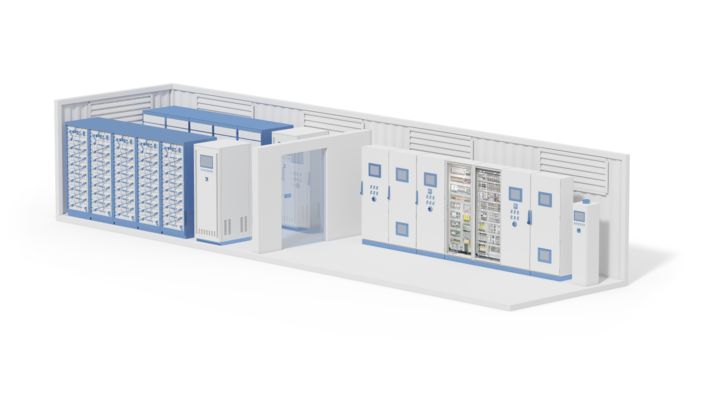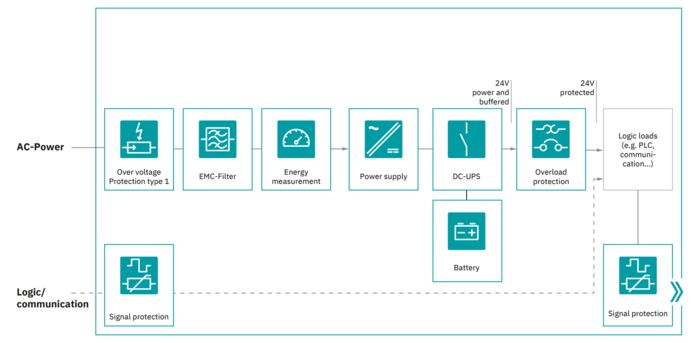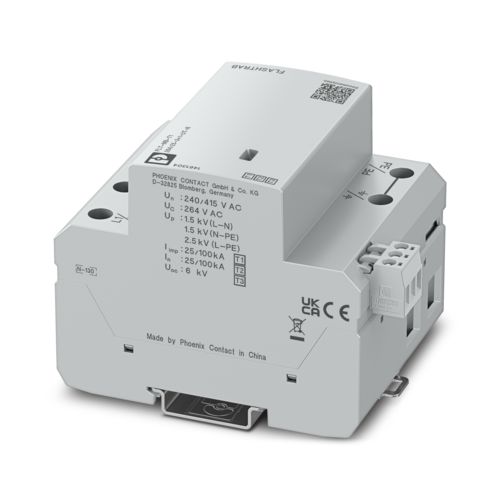Solutions for the reliable operation of battery storage systems Energy storage systems are becoming increasingly important for the sustainable electrification of the world. Our products and solutions enable you to ensure the reliable operation of such systems.

In an All Electric Society, in which more and more devices and systems are being operated electrically, battery storage systems are particularly important. They help to keep the power supply stable and reliable by balancing fluctuations in the power grid and using renewable energies such as solar power and wind power more efficiently. Battery storage systems help to reduce carbon emissions and contribute to promoting a sustainable energy future.
A battery energy storage system is modular in design. Important modules include: the battery management system (BMS), the power conversion system (PCS), the climate control system (HVAC), and the power management system (PMS). In addition, other modules are installed that ensure the safe operation of the battery energy storage system. These include, for example, the fire alarm system, auxiliary power supply for lighting, and the DC panel, which takes care of supplying and charging the batteries.
Schematic structure of a utility-scale battery storage system
Utility-scale storage systems with a capacity of several megawatt-hours play a crucial role in grid services. They compensate for fluctuations in the power grid and increase grid stability. In the event of low demand, excess energy is stored and released again in times of peak loads. They also support the integration of renewable energies and improve security of supply. Utility-scale storage systems can be modular or designed as a functional container.

Schematic structure of an industrial battery storage system
In contrast to utility-scale storage systems, industrial battery storage solutions meet specific requirements that are tailored to industrial systems. The optimization of energy costs through a load shift or the improvement of energy efficiency in production processes is the main focus here. They differ in terms of structure and the selection of components, and are often smaller than utility-scale storage systems.

Solutions for power management systems
PMS in utility-scale storage systems
The PMS is an essential part of an energy storage unit. This is where all the signals from the subsystems come together. Therefore, the requirements on availability are particularly high. All components in the PMS are protected by high-performance surge protection. The controller and communication supplies are backed up with a battery. A UPS ensures operation in the event of a failure in an upstream subsystem or in the AC supply. Device protection prevents failures due to overloads or short circuits. Energy measuring devices are used to monitor the performance data within the PMS.

PMS in industrial storage systems
Industrial battery storage systems and utility-scale storage systems differ in terms of capacity, complexity, and safety requirements. Industrial storage systems are smaller, are for specific applications, and have a simpler PMS. However, both systems must integrate seamlessly into the existing infrastructure.

Solutions for power conversion systems
PCS in an industrial energy storage unit
A PCS converts electrical energy. In this case, direct current (DC) from the batteries is converted to alternating current (AC) for the grid. The process is reversed when charging the batteries. The PCS controls the charging and discharging process, improves grid stability, and increases the efficiency of the energy storage system.

Solutions for AC panels
AC panel in a utility-scale storage system
The AC panel converts direct current (DC) into alternating current (AC) in a grid utility-scale storage system. In addition, the panel stabilizes the mains voltage and the mains frequency. All energy flows are monitored in the AC panel to ensure that the feed-in and procurement of the energy is recorded and managed efficiently.

Solutions for heating, ventilation, and air conditioning (HVAC)
HVAC in utility-scale storage systems
The HVAC systems (heating, ventilation, air conditioning) in large battery storage systems are essential for controlling the temperature and humidity to ensure optimum operating conditions. They prevent overheating and damage caused by moisture, increase efficiency, and extend the service life of the batteries. Furthermore, they increase safety by reducing the risk of fires and failures.

System availability in battery storage systems

Battery energy storage systems are important for compensating electricity fluctuations and for using renewable energy efficiently. They stabilize the power grid and help to manage peak loads.
You can use our products and solutions to ensure that your battery energy storage systems operate reliably and efficiently by making optimum use of the triad of supply, protection, and measurement in almost all modules of your battery storage system. With this approach, you actively contribute to the stabilization of the power grid and the efficient use of renewable energy.























